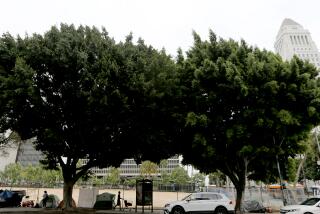Cursing the Curfew
- Share via
CHATSWORTH — The police report on a two-year curfew designed to curb youth crime concluded that it was ineffective, but San Fernando Valley high school students offered harsher evaluations Tuesday:
“Useless,” “pointless” and “invasive,” to name a few.
“It’s just harassment,” complained Traci Muzila, a senior at Stoney Point High School in Chatsworth, who, along with seven friends, recently received a citation after leaving a party after the curfew hour of 10 p.m.
“We have to pay money for being out when your parents are OK with it.”
Some teens, however, said the curfew has been a “good idea.”
Said Beatriz Esqueda, 17, a senior at San Fernando High School: “I think the streets are safer. I’ve noticed when I go out with parents. You don’t see as many gangsters.”
Two years ago the Los Angeles Police Commission and the City Council ordered the curfew enforcement on those under 18 years of age between 10 p.m. and 6 a.m.
The police report, submitted to the City Council on Monday, revealed that 3,600 officer-hours were devoted to enforcement and 4,800 citations issued. But the enforcement of the night-time curfew failed to reduce violent crime, the report said.
The daytime truancy law, although it does not target violent crime, has been credited with reducing burglary, shoplifting and car break-ins by 20% to 40%.
Tuesday, in a corner of the outdoor volleyball court at Stoney Point High, Muzila dominated the conversation among a group of girls.
“Only one of us paid,” she said of the eight girls cited. “The other seven did not pay and they don’t even have warrants. What does that tell you?”
“It’s a waste of time,” friend Kim Borst, 17, answered. “I think it’s pointless. We’re going to go out anyway.”
Educators saw the curfew as one tool helping students perform better at school.
“To my way of thinking, it certainly has to help if you have some kids that say, ‘Geez, I have to get home,’ ” said Charles Close, Stoney Point High principal. “If they are staying out of trouble, they tend to be more productive in school.”
“I think it keeps them in check,” said Chatsworth High Principal Fran Ramirez, roaming through hundreds of students on campus.
Other community leaders said the report’s findings were what they expected.
“I am not surprised by the results of the study,” said Marqueece Dawson, director of youth programs for the Community Coalition of South Central Los Angeles. Increasing restrictions on the freedoms of young people has always proven ineffective, he said.
Students saw practical flaws in the law.
For one, it should be up to parents--many of whom allow teens to stay out later than 10 p.m. to work or attend social events--to make the rules, the youths said.
Jarvis Brown, 18, a Granada Hills High senior, was recently walking home from his supermarket job when police picked him up and drove him to the station. After the officers confirmed he had been at work, they drove him home.
“People warned me” about possibly getting questioned by police, Brown said.
“Sometimes your employer will hold you after 10,” said Elyse Fox, 16, also of Granada Hills High. “[Officers] look at you weird; they drive by you slowly.”
There are other parent-sanctioned activities that keep teens out late.
“They usually stop you after football games. We go to Denny’s and they try to bust you right there,” complained Jory Goldberg, 17, who plays on the Granada Hills High team.
Police stopped him and his friends as they left a movie theater about 12:30 one night, he said. “They told us to go home and don’t stop anywhere.”
Said Joelle Raffoul, 16: “Your parents are supposed to give you your curfew.”
Other students say the curfew, which allows officers to question those they view as suspicious, does help prevent crime.
“Why do you have to be out that late?” said Luis De La Rosa, 17, of San Fernando High School.
“If you’re 18 or younger your first concern should be school,” said Gus Lomeli, 17, waiting outside the Pacoima campus to catch a ride to work.
“They mostly [question] fools that look like gangsters,” said Jose Anton, 17.
Many youths in the San Fernando/Pacoima neighborhood complain about being singled out by police because they have shaved heads and wear baggy clothes, following the style set by gang members, Anton said.
Youths dressed like that think twice about cruising Laurel Canyon Boulevard after curfew, where they are likely to draw police attention, he said.
“That is a problem,” Michelle Amador, 17, said of those who get singled out by police. “But I think that’s a risk you take when you dress that way. Those are the people who usually cause trouble.”
*
Times staff writer Daniel Yi contributed to this story.
More to Read
Sign up for Essential California
The most important California stories and recommendations in your inbox every morning.
You may occasionally receive promotional content from the Los Angeles Times.












